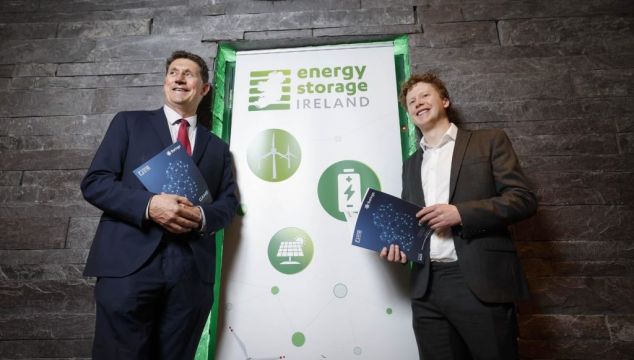Energy storage could cut Ireland’s annual carbon emissions by over one million tonnes and reduce annual electricity bills by more than €85 million, a conference has been told.
Industry representative body Energy Storage Ireland’s annual conference was opened on Thursday in Dublin by Minister for Environment and Climate Eamon Ryan, and heard calls for the Government to put in place an all-island energy storage strategy.
A new report from energy market specialists Baringa models how the Irish electricity system would operate in 2030 with 2,000 MW of energy storage on the system and identifies how this would cut both carbon emissions and prices.
“No electricity system can operate without a back-up and in Ireland this has traditionally been provided by fossil fuel generation,” Bobby Smith, head of Energy Storage Ireland, said.
“This new report from Baringa shows that over the next 10 years we can store increasing amounts of wind and solar power in energy storage projects and use it to support the system instead of relying on coal or gas.”
Energy storage ensures a secure supply of electricity, responding to demand in the event that a generator suddenly stops providing energy.
The most common form of energy storage in Ireland is battery storage which uses lithium-ion batteries - the same basic technology as is used in smartphones or in laptops - to store electricity.
When there are large volumes of wind energy on the system, a battery storage project stores this power and keeps it ready for when it might be needed to keep the electricity grid secure or to respond to sudden spikes in demand.
“The more energy storage we have on the system, storing electricity generated by wind or solar, the less we need to rely on fossil fuels,” Energy Storage Ireland says.
Almost 500 MW of energy storage is currently connected to the all-island electricity system and over 1 GW of projects have planning permission.
'New' energy crisis
Mr Smith said the need to decarbonise energy supply “is the greatest challenge humanity faces but since the start of this year we have faced a new, different, and growing, energy crisis.”
“The invasion of Ukraine and our dependency on imported fossil fuels means Irish electricity consumers have seen dizzying increases in their bills and the worst may yet be to come,” he said.
“Energy storage is an essential part of decarbonising our electricity system. It allows us to fully harness our renewable energy resources and replace expensive, polluting, fossil fuels.
“To accelerate the delivery of energy storage we need a coordinated strategy from policymakers in Ireland and Northern Ireland to redesign the electricity market to replace our fossil fuel back-up with a cleaner, cheaper, alternative.”







